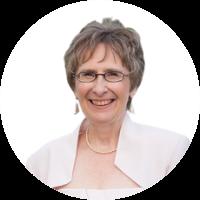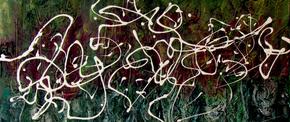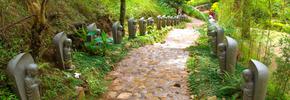The views expressed in our content reflect individual perspectives and do not represent the authoritative views of the Baha'i Faith.
For years I went to doctors, looking for answers to weird symptoms, only to be told there was nothing wrong. The message I got was: “It’s all in your head,” or “It’s just stress.”
So, I stopped relying on traditional medicine and looked to alternative methods of healing instead. But over the years, I spent a fortune on practitioners and supplements that offered only temporary relief at best.
A few years ago, I was introduced to a book written by Henry Wright, a Christian Minister, called A More Excellent Way. His premise: that “sin” causes many diseases. He claims to have lots of success healing people, by getting at the spiritual root of their ailments. He backs up each of his arguments with quotes from the Bible. They sound convincing, and his results seemed compelling.
RELATED: How to Stop Focusing on Other People’s Faults
Although his approach was both controversial and unconventional, I was tempted to try his principles by testing them out for myself; but first, I wanted to filter everything he said through the lens of the Baha’i teachings. I spent months trying to find Baha’i quotes to back up his theories and did find them in the Baha’i writings, because Baha’is believe that religious truth is one – as this single sentence written by Shoghi Effendi, the Guardian of the Baha’i Faith, proclaims:
The fundamental principle enunciated by Baha’u’llah, the followers of His Faith firmly believe, is that Religious truth is not absolute but relative, that Divine Revelation is a continuous and progressive process, that all the great religions of the world are divine in origin, that their basic principles are in complete harmony, that their aims and purposes are one and the same, that their teachings are but facets of one truth, that their functions are complementary, that they differ only in the non-essential aspects of their doctrines and that their missions represent successive stages in the spiritual evolution of human society.
First of all, in my quest for truth, I wanted to address the cringe-worthy link between sin – which Henry Wright defined as falling short of God’s commandments – and disease. What is a sin, I wondered? Originally, the word “sin,” or “khata” in its Hebrew Old Testament usage, meant “to fail” or “miss the goal.” This seemed to fit better with my own definition.
In a letter which Abdu’l-Baha, son of the founder of the Faith, wrote to an early believer, he said:
It is certainly the case that sins are a potent cause of physical ailments. If humankind were free from the defilements of sin and waywardness, and lived according to a natural, inborn equilibrium, without following wherever their passions led, it is undeniable that diseases would no longer take the ascendant, nor diversify with such intensity.
This led me to confront my own reaction to the word “sin.” I wondered – why does this word have the power to make us feel small, dirty, ashamed, less than, not good enough, a failure, and a host of other negative emotions?
I believe it’s because the word got mis-translated somewhere along the line; and then used to make us change our behavior by shaming us into doing what others want. For many of us, the word “sin” conjures up a negative “fire and brimstone,” “going straight to hell” kind of God, which isn’t what the Baha’i writings teach at all. Instead, Baha’is reject the idea of original sin, believing that “the child, still in the womb, is guilty of no sin …”
Personally, I love that Bahá’u’lláh, in one of his books, The Hidden Words, tells us that God created us perfectly:
O Son of Being! With the hands of power I made thee and with the fingers of strength I created thee; and within thee have I placed the essence of My light. Be thou content with it and seek naught else, for My work is perfect and My command is binding. Question it not, nor have a doubt thereof.
In Baha’u’llah’s Book of Certitude, he described human beings as “the noblest and most perfect of all created things …”
However, while we’re created perfect, we don’t stay that way as we develop. Abdu’l-Baha, in his book Some Answered Questions, said that we are all sinners:
In this material world, man is subject to the force of instinctual desires, of which sin is the inevitable consequence, for these desires are not bound by the laws of justice and righteousness. … It follows that sins – such as wrathfulness, envy, contentiousness, greed, avarice, ignorance, rancour, corruption, pride, and cruelty – must exist in the material world.
This suggests to me that God knew He was creating us as imperfect sinners, and it was all part of His perfect creation. I’m a sinner; you’re a sinner; we’re all sinners – so it’s a level playing field, which means none of us have the right to judge one another, because we all fall short of God’s spiritual injunctions. While we’re all sinners, though, we also have noble souls that can rise above our lower natures.
RELATED: He Died for the Sins of the World
Being a perfectionist, it was easy for me to make a list of all the ways I fell short in my attempts to be a “good Baha’i,” particularly in the areas of anger, fear, and self-pity. As long as I was looking for a medical answer to my ailments, I was labeled with “anxiety, depression and complex PTSD”, and there was little I could do about it. Once I saw the cause of my ailments as the “sins” of fear, grief and self-pity, the Baha’i writings showed me there was a great deal I could do to resolve them.
Please note: the Baha’i writings are very clear: it’s not enough to look at only the spiritual roots of disease. When we’re ill, we must see a doctor. Baha’u’llah wrote: “Whenever ye fall ill, refer to competent physicians. Verily, We have not abolished recourse to material means, rather have We affirmed it …”
Only when the doctors couldn’t find the cause of my ailments did I start to look for spiritual solutions. Understanding the nature of sin, then, became the core of my physical, mental, and emotional recovery from childhood trauma. If I could accept that God created me noble, and out of His love for me, and if I believed that His work is perfect and that His perfection includes the fact that we are all sinners, and that God forgives sinners, I didn’t have to be afraid of my own sin or judge anyone else for their sins either. I knew where to start to find healing. I could take every one of Henry Wright’s prescriptions and find the Baha’i equivalents and learn how to apply them in my own life. Excited by all I was learning, I wrote many books elaborating on topics such as sin, anger, fear, criticism, forgiveness, and happiness.
It’s not easy to find a quick “sound bite” on the topic of sin and how it effects the body. First, we need to understand how our lower nature works, and what our lives will look like when our thoughts turn to our higher nature. In another talk given by Abdul-Baha in Paris, he said:
For instance, a merchant may lose his trade and depression ensues. A workman is dismissed and starvation stares him in the face. A farmer has a bad harvest, anxiety fills his mind. A man builds a house which is burnt to the ground and he is straightway homeless, ruined, and in despair. All these examples are to show you that the trials which beset our every step, all our sorrow, pain, shame and grief, are born in the world of matter; whereas the spiritual Kingdom never causes sadness. A man living with his thoughts in this Kingdom knows perpetual joy. The ills all flesh is heir to do not pass him by, but they only touch the surface of his life, the depths are calm and serene.
If we want our depths to remain calm and serene, free from depression, anxiety, despair, sorrow, pain, grief, and shame, we need to fix our thoughts on the spiritual Kingdom, remembering that the bottom line is the Creator’s love for us. God loves us and forgives us, and when our guilt and shame show us what we need to change, we draw closer to Him and feel the warmth of His love. Knowing this, I am grateful!

















Comments
Sign in or create an account
Continue with Facebookor